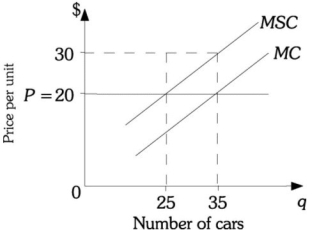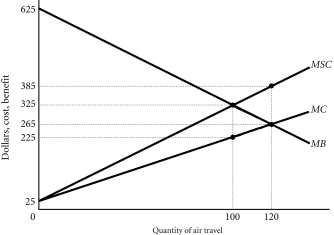Exam 16: Externalities, Public Goods, and Social Choice
Exam 1: The Scope and Method of Economics120 Questions
Exam 2: The Economic Problem: Scarcity and Choice110 Questions
Exam 3: Demand, Supply, and Market Equilibrium144 Questions
Exam 4: Demand and Supply Applications86 Questions
Exam 5: Elasticity86 Questions
Exam 6: Household Behavior and Consumer Choice137 Questions
Exam 7: The Production Process: the Behavior of Profit-Maximizing Firms144 Questions
Exam 8: Short-Run Costs and Output Decisions196 Questions
Exam 9: Long-Run Costs and Output Decisions187 Questions
Exam 10: Input Demand: the Labor and Land Markets123 Questions
Exam 11: Input Demand: the Capital Market and the Investment Decision116 Questions
Exam 12: General Equilibrium and the Efficiency of Perfect Competition99 Questions
Exam 13: Monopoly and Antitrust Policy200 Questions
Exam 14: Oligopoly110 Questions
Exam 15: Monopolistic Competition118 Questions
Exam 16: Externalities, Public Goods, and Social Choice170 Questions
Exam 17: Uncertainty and Asymmetric Information66 Questions
Exam 18: Income Distribution and Poverty143 Questions
Exam 19: Public Finance: The Economics of Taxation136 Questions
Exam 20: International Trade, Comparative Advantage, and Protectionism151 Questions
Exam 21: Economic Growth in Developing and Transitional Economies105 Questions
Select questions type
My neighbor ________ is an example of an external benefit.
Free
(Multiple Choice)
4.8/5  (31)
(31)
Correct Answer:
D
Suppose that you rent a house next to a factory. The factory legally emits a chemical into the air that smells like feet. You now have to spend $300 more per month on air fresheners because the firm pollutes the air. You could move to another house far enough away from the factory, but the rent for that house is $200 more than you now pay. The efficient solution to this problem is that
Free
(Multiple Choice)
4.8/5  (34)
(34)
Correct Answer:
B
As production increases, it is most likely that the marginal damage costs
Free
(Multiple Choice)
4.8/5  (36)
(36)
Correct Answer:
B
For the Coase theorem to apply, all of the following conditions must be satisfied EXCEPT:
(Multiple Choice)
4.7/5  (34)
(34)
Governments will likely achieve the optimal level of public goods, but not the correct amount of control over externalities.
(True/False)
4.7/5  (24)
(24)
Assuming there are no externalities, if a firm is producing at an output level where the benefits to consumers are less than the cost to the suppliers to produce it, then price
(Multiple Choice)
4.8/5  (36)
(36)
If there are external costs in production and firms do not have to account for these costs, then firms will produce
(Multiple Choice)
4.8/5  (33)
(33)
Assume there are two people in a society. Person A is willing to pay $70 to have one unit of a public good produced and Person B is willing to pay $80 to have one unit of a public good produced and $70 to have two units produced. As a result, for ________ unit(s) of this public good society would be willing to pay a price of ________.
(Multiple Choice)
4.7/5  (40)
(40)
Relating to the Economics in Practice on page 332: If a company that is responsible for an environmental disaster does not end up paying the entire cost of the damage it created, the marginal social cost will be ________ the sum of the marginal costs of production.
(Multiple Choice)
4.8/5  (26)
(26)
Refer to the information provided in Figure 16.2 below to answer the questions that follow.  Figure 16.2
-Refer to Figure 16.2. The unregulated (market) amount of cars is
Figure 16.2
-Refer to Figure 16.2. The unregulated (market) amount of cars is
(Multiple Choice)
4.7/5  (34)
(34)
Refer to the data provided in Table 16.2 below to answer the following questions.
Table 16.2
Tons of Glass MC MSC 1 20 40 2 30 50 3 40 60 4 50 70 5 60 80
-Refer to Table 16.2. This glass-recycling firm is perfectly competitive and is forced to take damage costs into account. If the market price of the product is $50, the firm will produce
(Multiple Choice)
4.8/5  (43)
(43)
The field of environmental economics is concerned with ________.
(Multiple Choice)
4.9/5  (34)
(34)
When the government imposes a tax on a firm that generates external costs, the tax is
(Multiple Choice)
4.8/5  (33)
(33)
You and two friends are going to the movies and are going to one of three movies: A, B, or C. You prefer movie A to movie B and movie B to movie C. One of your friends prefers movie B to movie C and movie C to movie A. You other friend prefers movie C to movie A and movie A to movie B. The three of you decide to use majority rule voting to decide which movie you will see. If you first have a vote between movies A and B and then between the winner of that vote and movie C, then movie ________ will win. However, if you first vote between movies A and C and then between the winner of that vote and movie B, then movie ________ will win. This is an example of the ________.
(Multiple Choice)
4.9/5  (31)
(31)
If the marginal cost of producing a public good is greater than society's total willingness to pay per unit, then
(Multiple Choice)
4.8/5  (36)
(36)
If a tax is imposed on externality-producing activities by perfectly competitive firms so that the market is producing the efficient level of output, then
(Multiple Choice)
5.0/5  (38)
(38)
Refer to the information provided in Figure 16.5 below to answer the questions that follow.
Los Angeles International Airport (LAX) is located next to Playa Del Rey. The noise from air traffic negatively affects individuals living in Playa Del Rey, however, this cost is not considered by airlines or air travelers. The airlines feel they have a right to use the airspace while the individuals living in Playa Del Rey feel they have the right to quiet. The following diagram depicts the marginal costs and marginal benefits associated with air travel.  Figure 16.5
-Refer to Figure 16.5. Suppose the government assigns property rights to the airlines. No negotiations occur between the parties. The resulting level of air travel is ________.
Figure 16.5
-Refer to Figure 16.5. Suppose the government assigns property rights to the airlines. No negotiations occur between the parties. The resulting level of air travel is ________.
(Multiple Choice)
4.8/5  (35)
(35)
Refer to the information provided in Figure 16.2 below to answer the questions that follow.  Figure 16.2
-Refer to Figure 16.2. What is the total damage imposed as a result of producing the market (unregulated) level of fertilizer?
Figure 16.2
-Refer to Figure 16.2. What is the total damage imposed as a result of producing the market (unregulated) level of fertilizer?
(Multiple Choice)
4.7/5  (35)
(35)
Showing 1 - 20 of 170
Filters
- Essay(0)
- Multiple Choice(0)
- Short Answer(0)
- True False(0)
- Matching(0)